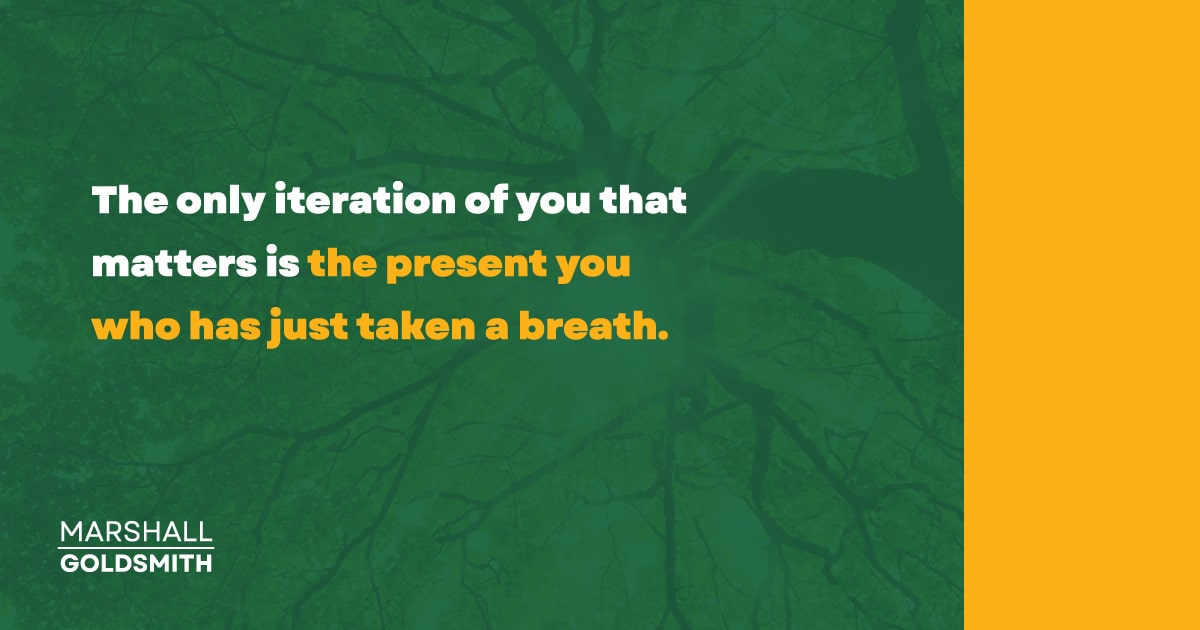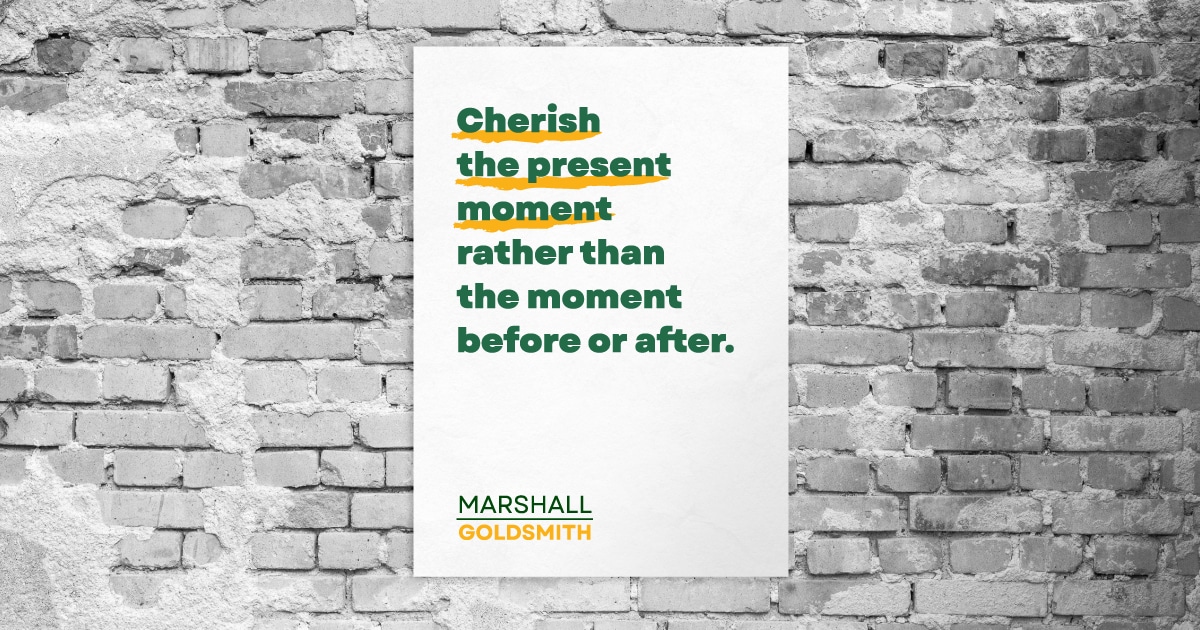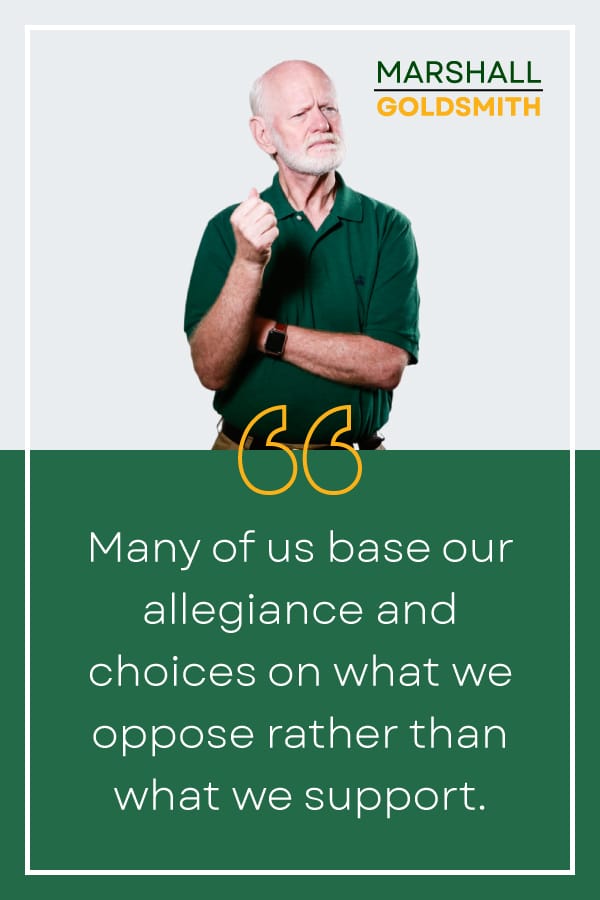Playing Favorites By Marshall Goldsmith There’s a reason I devote...

In Buddhism, every moment counts.
Now, this is not a new concept, but it is one that has had staying power, from the classical world to our own.
Writing several hundred years after Buddha, the Roman poet Horace was perhaps the first to use the phrase, “carpe diem,” or seize the day, in print. It appears in the first book of his Odes. He urged readers to take advantage of the moments they are living, to recognize the worth of living now rather than later.

Horace, by the way, also played upon the phrase in another ode, writing that you should “carpe florem,” or seize the flower — that is, appreciate the fleeting beauty around you. Everything dies, like fading flowers, so appreciate the beauty when you have it. It does not last.
There’s a reason that great artists and great religious figures have repeated this and similar phrases throughout the millennia: We too often forget to live in the present, to renew ourselves moment by moment. We think ahead to future moments rather than live fully in the present, which is the only reality we can inhabit. But our minds race forward.
When Gautama Buddha said, “Every breath I take is a new me,” he wasn’t speaking metaphorically. He meant it literally. Buddha was teaching that life is a progression of discrete moments of constant reincarnation from a previous you to a present you. At one moment, through your choices and actions, you may experience pleasure, happiness, sadness, or fear. But that specific emotion doesn’t linger. With each breath, it alters, eventually vanishing. It was experienced by a previous you.
Whatever you hope will happen in your next breath, or the next day, or the next year will be experienced by a different you, the future you. The only iteration of you that matters is the present you who has just taken a breath.
I start with the assumption that Buddha was right. He and other great thinkers have uttered or written similar thoughts, although from a different perspective, based on their cultures and individual genius. (Remember that I quoted Ralph Waldo Emerson in an earlier post. He was a transcendental thinker who often drew from eastern religions. He wrote, “This new day is too dear, with its hopes and invitations, to waste a moment on the yesterdays.” It’s within the spirit of that “new you,” that Buddha spoke about.)
Consider the meaning of what Buddha said, along with the tenets of Buddhism (I’m not suggesting you convert to Buddhism, by the way). I myself came to Buddhism when I was nineteen years old, not because I was looking to be converted to a new theology, but because it articulated ideas that were forming fuzzily in my curious teenage brain. I came to Buddhism for confirmation and clarity, not conversion.
After years of study, I came up with what I call the Every Breath Paradigm. I later employed it while discussing my work with clients, when I found it to be more effective than my Western training in helping them deal with behaviorally challenged bosses in the workplace. Steeped in the Western paradigm, clients would cling to their past triumphs as proof that they did not need to change their behavior to produce more triumphs. Their arguments with me would run along the lines of, “If I’m so bad, how come I’m so successful?” They would ignore the possibility that they were successful despite their faults, not because of them. Getting them to distinguish between their past and present selves via Buddha’s teaching was my Hail Mary pass to ensure that their next triumph was behavioral, not technical or intellectual.
Buddha’s insight is a new paradigm for thinking about your relationship to the passage of time and living an earned life.
A core pillar of Buddhism is impermanence—the notion that the emotions, thoughts, and material possessions we hold now do not last. They can vanish in an instant—as brief as the time we need to take our next breath. I mentioned this in earlier posts about worldly fulfillment or happiness: It is temporary. (Remember the “carpe florem” of the Roman poet Horace,)
We know this to be empirically true. Our discipline, motivation, our good humor—you name it—they do not last. They fall out of our grasp as suddenly as they appear.
Nevertheless, we have a hard time accepting impermanence as a rational way to understand our life, that the unity and uniqueness of our identity and character are an illusion.
The Western paradigm, which has been so deeply ingrained in us since childhood, is an ongoing argument against impermanence. Actually, it is a fairy tale, and it always has the same ending: “And then they lived happily ever after.” The Western paradigm is all about endeavoring for something better in the future and believing two things will result:
(a) whatever our improvement, we remain essentially the same person we have been (only better), and
(b) against all the evidence, this time it will last. It will be a permanent solution to whatever’s gnawing away at our spirit.
That makes about as much sense as studying hard for an A in math and thinking it will make you an A student forever, or believing that your personality is fixed and you can never change, or that rising housing prices will never go down.
This is the Great Western Disease of “I’ll be happy when…” With this mindset we convince ourselves that we’ll be happy when we get that promotion, or drive a Tesla, or finish a slice of pizza, or attain any other badge of our short- or long-term desires. Of course, when the badge is finally in our hands, something comes along that compels us to discount the badge’s value and renew our striving for the next badge. And the next. We want to reach the next level in the organizational hierarchy. We want a Tesla with more range. We want to order another slice of pizza to go. We are living in what Buddha called the realm of the “hungry ghost,” always eating but never satisfied.
This is a frustrating way to live. And this is why I’m urging a different way of seeing the world—one in which you cherish the present moment rather than the moment before or after.
Adding Too Much Value Won’t Get You There By Marshall...
C-Suite Master Class: No, But, However By Marshall Goldsmith Continuing...
The Doerr Institute: Expanding the Market for Coaches By Marshall...
Making Leadership Development Part of the College Degree at Rice...
Sanyin Siang – Winner of the Thinkers50 Marshall Goldsmith Coaching...
Thinkers50 Marshall Goldsmith Distinguished Achievement Award in Coaching – Nominees...
Leading with Influence: What Is Influence360°? By Marshall Goldsmith Founder...
Are You a Dominator, Manipulator, Persuader or Influencer? By Marshall...
Leading with Influence: Redefining Modern Influence Part 2 By Marshall...


My mission is simple. I want to help successful people achieve positive, lasting change and behavior; for themselves, their people, and their teams. I want to help you make your life a little better. With four decades of experience helping top CEOs and executives overcome limiting beliefs and behaviors to achieve greater success, I don’t do this for fame and accolades. I do this because I love helping people!
As an executive educator and coach, I help people understand how our beliefs and the environments we operate in can trigger negative behaviors. Through simple and practical advice, I help people achieve and sustain positive behavioral change.